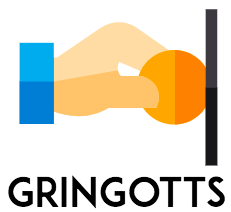Gringotts is a payment processing library in Elixir integrating various payment gateways, drawing motivation from Shopify's activemerchant gem and commerce_billing. Checkout the demo here.
Gringotts offers a simple and unified API to access dozens of different payment gateways with very different APIs, response schemas, documentation and jargon.
The project started out as a fork of commerce_billing and
the notable differences are:
- No
GenServerprocess to act as a "payment worker". - Consistent docs and good amount of tests.
- Support many more payment gateways.
From hex.pm
Add gringotts to the list of dependencies of your application.
# your mix.exs
def deps do
[
{:gringotts, "~> 1.1"},
# ex_money provides an excellent Money library, and integrates
# out-of-the-box with Gringotts
{:ex_money, ">= 2.6.0"}
]
endThis simple example demonstrates how a purchase can be made using a sample
credit card using the MONEI gateway.
One must "register" their account with gringotts ie, put all the
authentication details in the Application config. Usually via
config/config.exs
# config/config.exs
config :gringotts, Gringotts.Gateways.Monei,
userId: "your_secret_user_id",
password: "your_secret_password",
entityId: "your_secret_channel_id"Copy and paste this code in a module or an IEx session, or use this handy
.iex.exs for all the bindings.
alias Gringotts.Gateways.Monei
alias Gringotts.CreditCard
# a fake sample card that will work now because the Gateway is by default
# in "test" mode.
card = %CreditCard{
first_name: "Harry",
last_name: "Potter",
number: "4200000000000000",
year: 2099, month: 12,
verification_code: "123",
brand: "VISA"
}
# a sum of $42
amount = Money.new(42, :USD)
case Gringotts.purchase(Monei, amount, card) do
{:ok, %{id: id}} ->
IO.puts("Payment authorized, reference token: '#{id}'")
{:error, %{status_code: error, raw: raw_response}} ->
IO.puts("Error: #{error}\nRaw:\n#{raw_response}")
endAll financial applications must take proper care when representing money in
their system. Using simple floating values might lead to losses in the real
world due to various reasons.
Most payment gateways are strict about the formatting of the amount in the
request, hence we cannot render arbitrary floating amounts like
$4.99999. Moreover, such amounts might mean something to your application but
they don't have any value in the real world (since you can't charge someone for
a fraction of a US cent).
Your application must round such amounts before invoking Gringotts and manage any remainders sensibly yourself.
Gringotts may perform rounding using the
half-evenstrategy, but it will discard remainders if any.
Gringotts does not ship with any library to work with monies. You are free to
choose any monie library you wish, as long as they implement the
Gringotts.Money for their type!
That said, we recommend [ex_money][ex_money] (above v2.6.0) to
represent monies. You just have to add it in your deps().
| Gateway | PCI compliance | purchase |
authorize |
capture |
void |
refund |
(card) store |
(card) unstore |
|---|---|---|---|---|---|---|---|---|
| Authorize.Net | mandatory | ✅ | ✅ | ✅ | ✅ | ✅ | ✅ | ✅ |
| CAMS | mandatory | ✅ | ✅ | ✅ | ✅ | ✅ | ❌ | ❌ |
| MONEI | mandatory | ✅ | ✅ | ✅ | ✅ | ✅ | ✅ | ❌ |
| PAYMILL | optional | ✅ | ✅ | ✅ | ✅ | ✅ | ❌ | ❌ |
| Stripe | optional | ✅ | ✅ | ✅ | ✅ | ✅ | ✅ | ✅ |
| TREXLE | mandatory | ✅ | ✅ | ✅ | ❌ | ✅ | ✅ | ❌ |
Apart from supporting more and more gateways, we also keep a somewhat detailed plan for the future on our wiki.
Gringotts has a nice ring to it. Also this.
MIT


